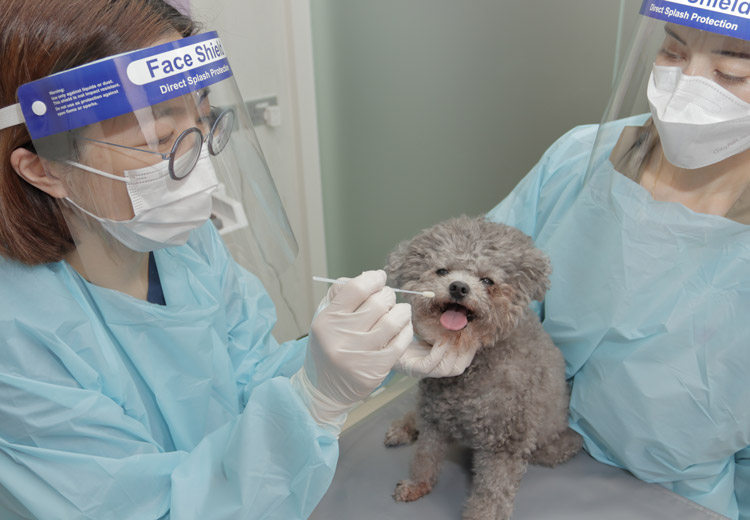CityU protects local citizens and their pets

A testing and quarantine facility will curb animal-human infections and care for sick owners’ pets
City University Hong Kong (CityU) is working to set up Covid-19 testing and quarantining for the city’s pets – both to care for them if their owners are ill and to stop pets infecting people.
As the city’s only veterinary school, the Jockey Club College of Veterinary Medicine and Life Sciences at CityU is well placed to help the city’s human and animal inhabitants, and has the expertise to deal with disease outbreaks.
Sneezing hamsters were the prime suspects in a coronavirus delta variant infection cluster in Hong Kong. Many scientists think the SARS-CoV-2 virus originally escaped from an animal reservoir into humans, and there are examples of animals, such as mink, becoming infected with the virus and transmitting it back to humans.
As a result of the suspected hamster-to-human transmission, Hong Kong authorities embarked on a mass cull of hamsters to curb disease transmission. But domestic pets such as hamsters and cats are common in the city, and people will want to protect their pets, explains Nikolaus Osterrieder, dean of the Jockey Club College of Veterinary Medicine and Life Sciences.
However, the city’s capacity to quarantine animals is limited. “We’re trying to make provisions around pet testing, but also potentially offering quarantine for animals that come out of so-called Covid households or for owners that have to undergo mandatory quarantine if they are considered close contacts of Covid cases,” Osterrieder says.
Currently in Hong Kong, anyone who tests positive for the virus must complete mandatory quarantine in a hospital ward for 10 days. As cases rise in the city, Osterrieder is concerned that there will be no one to care for the animals left behind at home.
“The first thing is to make sure that these animals are taken care of and that we can test them for the virus,” Osterrieder says. “We’re trying to find a location [for such a facility] and have all the infrastructure in place so that those animals can go into quarantine and be retested on a regular basis.”
While the Covid-causing virus may be present in wild populations, domestic pets are a more likely source of human infection, says Osterrieder. “The [hamster] case has highlighted yet again how important it is not only to look at humans in isolation, but to include animal populations as well.”
One of the school’s major strengths is in disease modelling, he says, and veterinary research has a vital advisory role to play in human pandemics.
“We deal with large populations with high infection pressures imposed by, for example, avian flu and African swine fever,” Osterrieder explains. As a result, veterinary research hubs such as the Jockey Club College understand the efficacy and consequences of various disease containment strategies, such as lockdowns and quarantine, on disease transmission. “We deal with this on a daily basis,” he says.
Animal health and human health go hand-in-hand, Osterrieder emphasises. By establishing a domestic animal testing and quarantine facility, CityU is working to help people protect their pets and reduce Covid-19 infections. “Animal welfare is human welfare,” Osterrieder says.

Nikolaus Osterrieder is currently dean of the Jockey Club College of Veterinary Medicine and Life Sciences at City University. He previously served as professor of virology and chair at Freie Universität Berlin and is now adjunct professor of virology at Cornell University. He has continued to work on oncogenic herpesvirus and Marek’s disease virus of chickens during his time on the faculty at Cornell and in Berlin. More recently, his research extended to influenza and coronaviruses such as infectious bronchitis virus in chickens and canine coronaviruses. Osterrieder has more than 270 scientific publications and his h-index currently stands at 58.
Find out more about the Jockey Club College of Veterinary Medicine and Life Sciences at CityU.